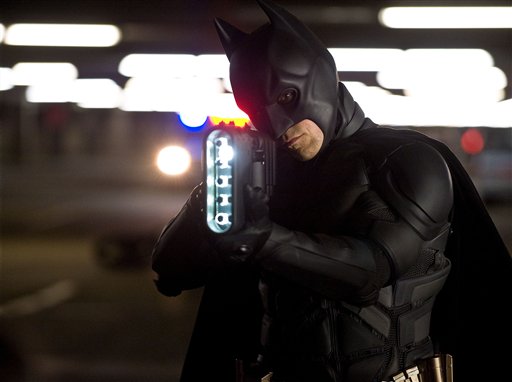In perhaps the least self-aware review of the politics of “The Dark Knight Rises” yet, Steven Zeitchik of the Los Angeles Times is befuddled at the idea that left-wing thought could ever be portrayed negatively. First, he admits his own incompetence:
[M]ore politics doesn’t mean your movie’s message is more consistent or decipherable.
Or perhaps the politics of “The Dark Knight Rises” is perfectly consistent and decipherable … and Zeitchik just doesn’t get it. In the next few lines, he shows that he has no clue what he’s talking about:
Contradictions abound in “The Dark Knight Rises.” There is a man (Thomas Hardy‘s Bane) who urges populist unrest against a monied elite and a woman (Anne Hathaway‘s Selina Kyle) who speaks the language of social justice, stirringly asking a member of the 1% “how you ever thought you could live so large and leave so little for the rest of us.” Yet both are, for at least chunks of the movie, villains — in Bane’s case, murderously and maliciously so.
Zeitchik’s confusion is almost hysterical here. Occupy rhetoric … bad?!?! Populist unrest … negative?!?! Zeitchik is deeply perplexed at the concept of class warfare being deconstructed on screen. He continues:
Meanwhile, the hero (Christian Bale‘s Bruce Wayne/Batman), the man we’re rooting for, the one who’s going to make it all OK, is … a billionaire who sits on his money? A man who for parts of the film is as addicted to the thrills and the spotlight as much as he believes in the value of altruism? A man so disaffected he even forgets to write a check to his own orphanage?
My God, says Zeitchik – he’s rich and he’s not the villain? In point of fact, Wayne gets taken to task for having left the world and holed up in Wayne Manor – he’s supposed to give charity, invest diligently, create wonderful projects. That’s the point of the film, too – that running from the world isn’t a solution to the world’s ills. But again, Zeitchik can’t deal with the idea of the rich guy as the hero.
What this all adds up to makes the head spin a little. Are we supposed to root for complacency? Or reevaluate our notions of equality and justice because its champions practice wanton murder? Or perhaps we should just decry the whole lot of them.
Well, no. We’re supposed to embrace Bruce Wayne for his obvious morality, and encourage him to get back in the game (as he does). And if your notions of justice and equality are those of Bane and Selina Kyle, you’re in the same boat as those practitioners of “wanton murder.” They’re called communists.
In the film’s most blatantly political scene, Bane whips supporters into a populist frenzy as they literally rip wealthy people out of their penthouses to beat and rob them. It’s a jarring viewing experience. The language of revolt and justice would seem to call for sympathy with the rebels. But the violence of their attacks makes you side, discomfittingly and reflexively, with the pampered rich.
This is simply hilarious. Zeitchik doesn’t seem to understand that the Russian Revolution and French Revolution were bad things. As it turns out, brutal class rebellion is not a net good. And Nolan makes that clear. Nolan’s not bamboozled. Zeitchik is.
But instead of seeing the obvious message here – class warfare, revolutionary Marxism, and populist demagoguery are nasty – Zeitchik prefers to somehow weave the themes of “The Dark Knight Rises” into a leftist bromide:
But there is a way to synthesize all of this, to argue that Nolan supports neither Bane-ish unbridled activism nor Wayne-like apathetic opportunism. It’s a combination of the two, a kind of cherry-picking from both sides, a kind of responsible capitalism.
By putting universal truths in the mouth of someone as malignant as Bane, Nolan isn’t necessarily disavowing the message. He’s just warning us that it can mutate quickly.
And Wayne, for all his selfishness, is of course jolted out of his apathy. In the film’s climactic moments, he not only risks his life to save others but then — in an epilogue — also opens up an orphanage. And it’s the latter Wayne that Nolan holds up as a hero.
Think about a revolution, Nolan seems to be saying, but conduct it mercifully. Practice free-markets, but do it with a soul.
Or, Nolan is ripping Bane and Kyle for living in a fantasy political world of fascism and communism. And he’s encouraging Batman and Bruce Wayne to fight against the establishment of that world.
Only a leftist like Zeitchik could fail to see the message of “The Dark Knight Rises.” It just demonstrates the blindness of those in Hollywood that they can’t even fathom the notion that somebody disagrees with their class warfare politics. And it shows the intolerance of Hollywood that critics simply assume Nolan must be pushing leftism cleverly rather than embracing traditional American values.

COMMENTS
Please let us know if you're having issues with commenting.